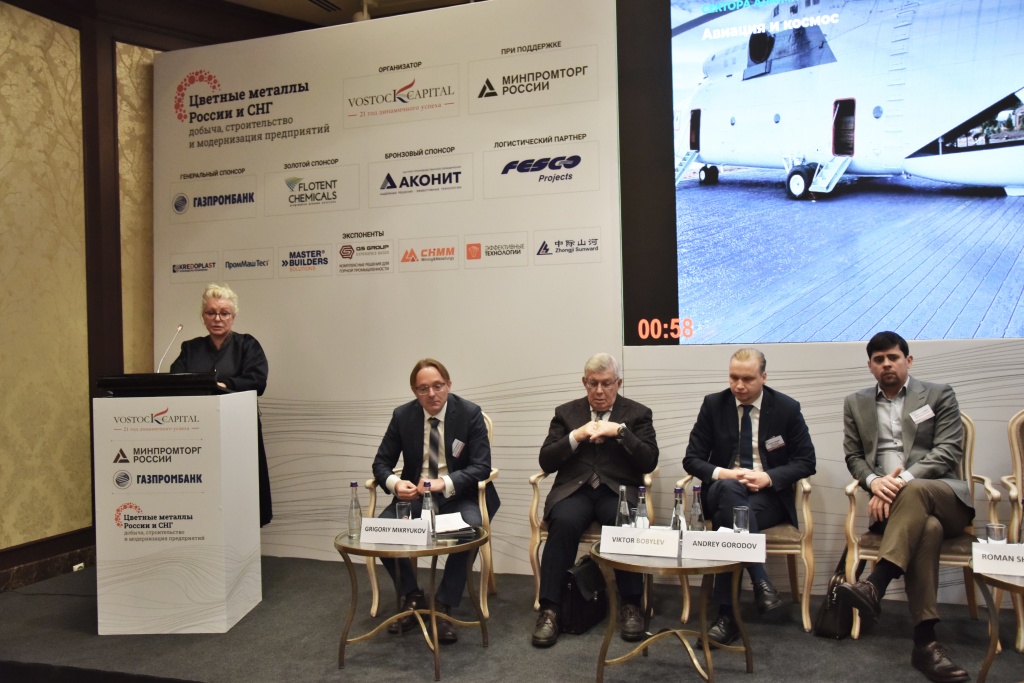21.11.2023 - Aluminium Association
Irina Kazovskaya, Chairperson of the Aluminium Association, discussed the current situation and prospects of the domestic aluminium market at the Non-Ferrous Metals in Russia and the ex-USSR Countries: Mining, Construction and Production Facility Retrofitting International Forum (November 21-22, Moscow). The event attendees discussed current issues of non-ferrous metallurgy, investment projects, and opportunities to enhance the efficiency of the existing production facilities. The Forum was attended by representatives from the Russian Ministry of Industry and Trade, Ministry of Economic Development, non-ferrous metallur-gy companies, industry associations, and engineering and construction businesses.
As reported by the Russian Ministry of Industry and Trade, the total investment in the non-ferrous sector over the first six months of this year reached RUB 342.5 billion
Irina Kazovskaya highlighted that Russia is the world’s second-largest aluminium manufacturer, producing 4 million tonnes annually, with 1 million tonnes consumed domestically. According to the Aluminium Associa-tion’s strategic goals, domestic aluminium consumption should increase by more than 400,000~500,000 tonnes to reach 1.5 million tonnes per year by 2030. This requires the development of high-tech manufac-turing operations within all aluminium-consuming sectors in the country. As part of this, the Aluminium As-sociation with its partners is working on a number of projects to promote aluminium consumption in the automotive sector (localization of cast components, light-alloy wheels, engine manufacturing), construction (aluminium for residential projects, road infrastructure, localization of greenhouse manufacturing, import substitution for building materials, etc.), power engineering (power grids, new cables), heavy and transport manufacturing (hopper railcars, tankers), consumer products (replacement of imported utensils and radia-tors, cans, tubes and cylinders, foil packaging), etc.

The Aluminium Association’s mission is to facilitate domestic in-depth recycling of aluminium, build new production capacities, establish standards and regulations, foster international trade, and build new compe-tencies
A significant metric of industrial development is per capita aluminium consumption. Higher aluminium con-sumption indicates the progress of domestic high-tech industries, for which this metal is critically important: green construction, power generation, automotive, manufacturing, recyclable packaging, and so on. In Rus-sia, this figure was 5.3 kg in 2015, and it now exceeds 10 kg, approaching the continually increasing global average.
The construction sector is the largest consumer of aluminium in the country, accounting for 240 kt Al (25%), followed by packaging, transport, and power generation industries. Currently, there is a high demand for aluminium in the construction sector. This is due to aluminium’s advantages such as lightness, durability, reduced lifetime ownership cost, high corrosion resistance, and eco-friendliness. The Aluminium Association is working on road infrastructure development, with 63 bridges at various stages of completion, including unique projects like off-the-shelf bridges, railway overpasses, and the country’s first aluminium road bridge due for completion this year).
In May this year, the Russian Government approved a plan initiated by the Aluminium Association to stimu-late demand for aluminium industry products by 2025, with a view to 2030. A key focus of the Plan is local programmes for the use of advanced aluminium structures and products across many sectors, from transport infrastructure and housing construction to healthcare and education facilities.
“The Plan primarily aims to ensure the country’s technological independence in the field of aluminium products. In the current situation, we must promote high-tech aluminium product exports, protect the domestic market from imports, and increase the manufacturing of critical aluminium products not previ-ously produced in Russia," notes Irina Kazovskaya.

